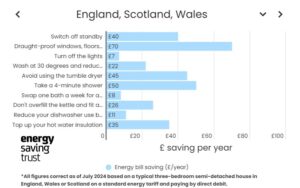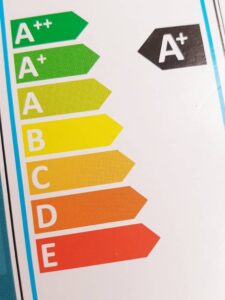How to Save on Your Home Energy Bills
Estimated reading time: 9 Minutes
As energy prices continue to rise, reducing your home energy use has become a top priority for households. Managing energy costs helps maintain a household budget but also significantly reduces carbon emissions and contributes to environmental sustainability. For millions of people across the UK, especially during the colder months, energy bills can be a financial worry, making it vital to find ways to cut down on unnecessary usage while still keeping homes warm and comfortable.

In this guide, we’ll cover some practical steps you can take to save money on both your heating bills and overall energy usage. These tips should help you reduce heating and energy bills.
How to Save on Heating Bills
Heating is one of the largest contributors to energy costs in UK households, especially during winter. Here are several key strategies to help you save on your heating bills:
Insulate Your Home Properly
Proper insulation is one of the most effective ways to reduce heat loss and cut heating costs. without insulation your home loses heat quickly, forcing your heating system to work harder to maintain a comfortable temperature, potentially costing more to run the heating.
- Loft Insulation: As heat rises, poorly insulated lofts are a major source of heat loss. Ensuring your loft has at least 270mm of insulation can significantly reduce heat loss, saving up to £250 per year on energy bills.

- Wall Insulation: If your home has cavity walls, insulating them can prevent heat from escaping through the walls. Solid wall insulation is also available for homes without cavity walls, though it can be more expensive upfront. However, the savings over time make it a worthwhile investment.
- Draught-Proofing: Simple, inexpensive measures like draught-proofing your doors, windows, and chimneys can prevent cold air from entering and warm air from escaping. Draught excluders under doorways, letterbox covers are useful or you can tape over them to seal any gaps, and window sealants are easy DIY solutions that can make a noticeable difference.
Adjust Your Thermostat Settings
One of the simplest ways to save on heating bills is to adjust your thermostat settings. Reducing the temperature by just 1°C can cut your heating bills by around 10%.
- Smart Thermostats: Upgrading to a smart thermostat allows you to control your heating remotely and create more efficient heating schedules. Some smart thermostats also adapt to your lifestyle, automatically adjusting temperatures to save energy when you’re away from your home or asleep or they react to the outside weather conditions.

- Programmable Thermostats: If you don’t have a smart thermostat, consider using a programmable one. You can set it to turn the heating off when you’re not home and turn it on just before you return, ensuring you don’t waste energy heating an empty house.
- Zoned Heating: For larger homes, consider zoning your heating system. By heating only the rooms that you use regularly, such as living spaces during the day and bedrooms at night, you can reduce energy waste. This is easy to do with radiators – simply turn off the ones you don’t need.
Upgrade Your Boiler
If your boiler is more than 10 years old, there’s a chance it’s inefficient compared to modern models. Upgrading to a new, energy-efficient boiler can save you hundreds of pounds a year.
- Energy-Efficient Boilers: Modern boilers are designed to use less fuel to generate the same amount of heat. Look for models with high energy efficiency ratings (A-rated) to reduce your energy consumption.
- Boiler Maintenance: Regularly servicing your boiler ensures it’s running efficiently. A poorly maintained boiler can waste energy and cost more to run, so annual servicing is crucial. See our guide on why boiler servicing is important.
- Boiler Upgrade Schemes: The UK government offers various grants and schemes to help cover the cost of replacing an old boiler with a more energy-efficient model. Keep an eye out for initiatives like the goverment Boiler Upgrade Scheme.
If you’re thinking about upgrading your boiler then contact us today. We’re experienced boiler installers with experience in many different boiler systems including residential and commercial systems.
Use Your Heating Efficiently
Making small adjustments in how you use your heating can add up to substantial savings.
- Set Timers for Your Heating: Use your heating system’s timer to ensure it only comes on when needed. A good strategy is to set it to come on 30 minutes before you wake up and to go off around 15-20 minutes before you leave the house. You can do the same in the evening before bedtime.
- Radiator Reflectors: Placing reflective panels behind radiators can prevent heat from being absorbed by the walls and instead reflect it back into the room. This is especially useful for radiators on external walls.
- Bleed Your Radiators: If your radiators aren’t heating up fully, it could be because air is trapped inside. Bleeding them releases trapped air and allows the radiator to heat up more efficiently.
How to Reduce Energy Bills
Beyond heating, there are numerous ways to reduce your overall energy consumption at home to help reduce your energy bills. From upgrading appliances to adopting small energy reducing habits, you can make small changes that result in significant savings over time. Below are practical steps you can take to cut your energy bills.
Switch to Energy-Efficient Appliances
One of the easiest ways to reduce your electricity usage is by choosing energy-efficient appliances. Many households in the UK still use older, less efficient devices that consume more energy than necessary.
While replacing old appliances may come with high upfront costs generally over time the cost to run these appliances will be cheaper and therefore save you money in the long run.

- Energy Ratings: When purchasing new appliances, look for the highest energy efficiency ratings (A+++, A++, or A+). Common home appliances like washing machines, dishwashers, kettles and fridges with these ratings use significantly less electricity than lower-rated older models.
- LED Lighting: Switching to LED bulbs from traditional incandescent or halogen bulbs can cut your lighting costs by up to 90%. LED bulbs last longer and use a fraction of the electricity.
- Smart Plugs and Energy Monitors: Smart plugs allow you to monitor and control the energy usage of individual devices remotely. Energy monitors track your overall electricity consumption and can help you identify where energy is being wasted. Smart plugs can utilise timers to turn off lights or switches at set times to ensure they’re not being used when not needed.
Install a Smart Meter
Smart meters have been rolled out across the UK to help households monitor their energy usage in real-time. They can be a valuable tool for identifying where energy is being wasted and encouraging more conscious usage.
- Real-Time Monitoring: Smart meters display your energy usage in real-time, showing how much you’re spending and helping you identify high-consumption devices. Many energy providers offer smart meters for free as part of their energy-saving initiatives.
- Accurate Billing: With a smart meter, you’ll be billed for the exact amount of energy you use, eliminating the need for estimated bills. This helps you better manage your budget and prevent unexpected costs.
Reduce Standby Power
Many devices continue to draw power even when turned off, contributing to unnecessary energy consumption. This is known as “phantom load” “vampire power” or standby power. Some notorious devices for this include game consoles, TVs, home speakers and some kitchen appliances.
- Unplug Devices: Get into the habit of unplugging unused devices or switch them off at the plug. Game consoles are often culprits for this due to “energy saving modes” where the console is “off” but is actually on in a low-power state. This means the console can still receive updates and messages which while handy it’s good for energy consumption or reducing energy bills.
- Use Power Strips/Extension leads: Plug multiple devices into a power strip so that you can easily turn off several items at once when they’re not in use.
Use Appliances Efficiently
Sometimes changing our habits can have a big impact. Changing how you use your household appliances can lead to energy savings without requiring any expensive upgrades.
- Washing Clothes: Wash clothes at 30°C instead of higher temperatures, and only run your washing machine when you have a full load. This reduces the amount of water and electricity used per wash. Many modern detergents are formulated to work well at 30°C.
- Air-Dry Laundry: Whenever possible, hang clothes to dry instead of using a tumble dryer. Tumble dryers are one of the most energy-hungry appliances in the home!
- Efficient Cooking: When using an oven, try to batch cook meals so you make the most of the heat being generated. Using the microwave, air fryer or slow cooker is also far more energy-efficient for cooking small portions.
Explore Renewable Energy Options
For households looking to make a bigger, long-term investment then renewable energy can be an excellent option.
- Solar Panels: Solar panels allow you to generate your own electricity using sunlight. Although the initial installation cost can be high, the long-term savings are substantial. Some energy providers offer schemes to help with installation costs, and you can sell any excess energy back to the grid through the Smart Export Guarantee (SEG).
- Battery Storage Systems: If you install solar panels, consider pairing them with a battery storage system. This allows you to store excess energy generated during the day for use in the evenings, reducing your reliance on the grid.
Small Habit Changes That Make a Big Impact
As we’ve often alluded to so far, sometimes it’s the small everyday changes that can make a big difference. Here are some quick fire tips to help you reduce your energy bills.
- Use a Clothesline Instead of an energy intensive Tumble Dryer.
- Take Shorter showers to reduce the energy consumption needed to heat water.
- Close curtains and blinds at night – this helps to retain heat.
- Turn off lights when you leave a room.
- Batch cook and use appliances wisely.
- Keep the Fridge and Freezer full – it’s more efficient than an empty one!
- Use lids on pots when cooking.
- Unplug chargers when not in use.
- Only boil the water you need.
- Move furniture away from radiators to allow full heat circulation.
Reducing your Energy Bills with Huttie
Reducing your home energy bills doesn’t have to be complicated or expensive. By making small adjustments to your habits, insulating your home, and using energy-efficient appliances, you can make a significant difference in both your monthly bills and your environmental impact. Every step you take, from lowering your thermostat to unplugging devices, adds up to meaningful savings over time helping your reduce your energy bills.
If you’re looking for professional help with projects like boiler repairs or upgrades, boiler servicing and maintenance, installing renewable energy solutions, or exploring air source heat pumps, contact Huttie. Our expert team can help you find the most efficient solutions for your home, making it more energy-efficient and helping you save on heating and energy bills in the long run.
